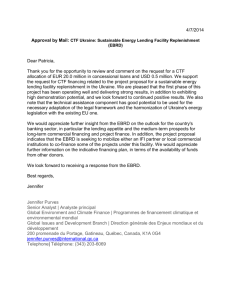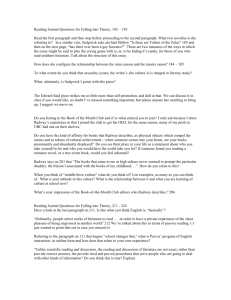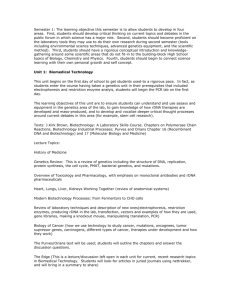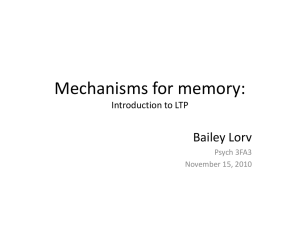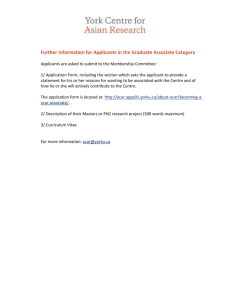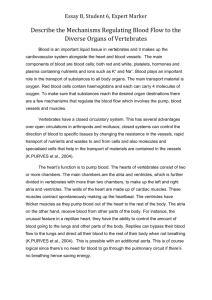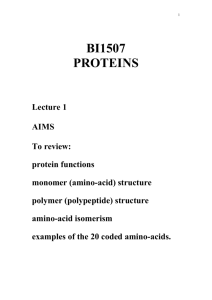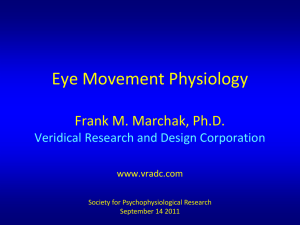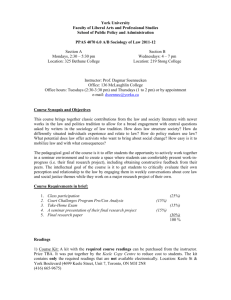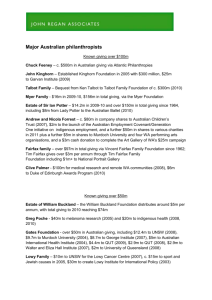Neurobiology - Faculty of Science
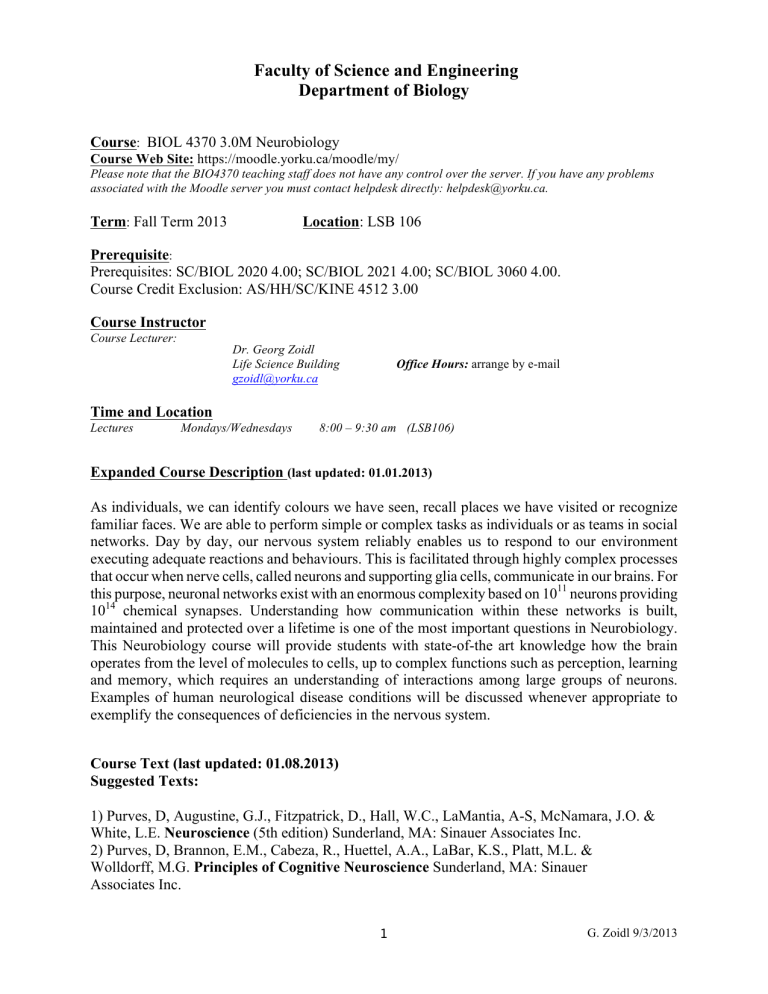
Faculty of Science and Engineering
Department of Biology
Course : BIOL 4370 3.0M Neurobiology
Course Web Site: https://moodle.yorku.ca/moodle/my/
Please note that the BIO4370 teaching staff does not have any control over the server. If you have any problems associated with the Moodle server you must contact helpdesk directly: helpdesk@yorku.ca.
Term : Fall Term 2013 Location : LSB 106
Prerequisite :
Prerequisites: SC/BIOL 2020 4.00; SC/BIOL 2021 4.00; SC/BIOL 3060 4.00.
Course Credit Exclusion: AS/HH/SC/KINE 4512 3.00
Course Instructor
Course Lecturer:
Dr. Georg Zoidl
Life Science Building gzoidl@yorku.ca
Office Hours: arrange by e-mail
Time and Location
Lectures Mondays/Wednesdays 8:00 – 9:30 am (LSB106)
Expanded Course Description (last updated: 01.01.2013)
As individuals, we can identify colours we have seen, recall places we have visited or recognize familiar faces. We are able to perform simple or complex tasks as individuals or as teams in social networks. Day by day, our nervous system reliably enables us to respond to our environment executing adequate reactions and behaviours. This is facilitated through highly complex processes that occur when nerve cells, called neurons and supporting glia cells, communicate in our brains. For this purpose, neuronal networks exist with an enormous complexity based on 10
10 14
11 neurons providing
chemical synapses. Understanding how communication within these networks is built, maintained and protected over a lifetime is one of the most important questions in Neurobiology.
This Neurobiology course will provide students with state-of-the art knowledge how the brain operates from the level of molecules to cells, up to complex functions such as perception, learning and memory, which requires an understanding of interactions among large groups of neurons.
Examples of human neurological disease conditions will be discussed whenever appropriate to exemplify the consequences of deficiencies in the nervous system.
Course Text (last updated: 01.08.2013)
Suggested Texts:
1) Purves, D, Augustine, G.J., Fitzpatrick, D., Hall, W.C., LaMantia, A-S, McNamara, J.O. &
White, L.E. Neuroscience (5th edition) Sunderland, MA: Sinauer Associates Inc.
2) Purves, D, Brannon, E.M., Cabeza, R., Huettel, A.A., LaBar, K.S., Platt, M.L. &
Wolldorff, M.G. Principles of Cognitive Neuroscience Sunderland, MA: Sinauer
Associates Inc.
1 G. Zoidl 9/3/2013
The suggested textbooks will be supplemented with more advanced material via the lecture when appropriate. For students interested in additional information the following textbook is recommended.
Fundamental Neuroscience , 4th Edition, Editor(s): Squire & Berg & Bloom & du Lac &
Ghosh & Spitzer, Release Date: 06 Nov 2012, Imprint: Academic Press, ISBN:
9780123858702. This textbook is ideal for graduate and advanced undergraduate students in neuroscience and neurobiology, edited and authored by some of the foremost leaders in the field, with comprehensive coverage of systems neuroscience.
Please note that a considerable number of other excellent textbooks from various publishers exist and interested students are welcomed to explore these options.
The Librarian at YorkU has been informed about the suggested text books and copies of the above mentioned books are hold at the Library.
Evaluation
The final grade for the course will be based on the following items weighted as indicated:
Midterm Examination (in class) 45%
Final Examination (Fall Exam Session): 55%
Both exams will consist of 40 questions. 30 questions will be multiple choice questions and the remaining
10 questions will be made up of short answer questions, which may include labelling of figures. Students will have 1.5 min to answer each question (40 x 1.5 min = 60min total). Each exam question will be designed to have a single correct answer. Questions will be discussed and explained in the classroom for all students after the exam to intensify and deepen the learning objectives of this course. Due to the restricted access to my office at LSB, this will be the only opportunity to discuss these questions face to face.
Grading : The grading scheme for the course conforms to the 9-point grading system used in undergraduate programs at York (e.g., A+ = 9, A = 8, B+ = 7, C+ = 5, etc.). Tests will bear either a letter grade designation or a corresponding number grade (e.g. A+ = 90 to 100, A = 80 to
90, B+ = 75 to 79, etc.)
(For a full description of York grading system see the York University Undergraduate Calendar - http://calendars.registrar.yorku.ca/pdfs/ug2004cal/calug04_5_acadinfo.pdf)
Note: Final course grades may be adjusted to conform to Program or Faculty grades distribution profiles. If an adjustment needs to be made, this will be done at the end of term.
Students may take a limited number of courses for degree credit on an ungraded (pass/fail) basis.
For full information on this option see http://www.registrar.yorku.ca/pdf/passfail_option.pdf
Posting of Grades: Grades for tests will be posted on the course website as soon as they are available. Please do not ask when they will be available as the answer will inevitably be “as soon as possible”.
2 G. Zoidl 9/3/2013
Missed Tests
Midterm: If you miss the midterm exam for medical reasons (only valid excuse), the make-up exam will be scheduled in the week following the class exam. This make-up exam is ONLY offered once. The exact location and time will be posted.
Attending Physicians form (available at http://www.registrar.yorku.ca/pdf/petitions/attending_physician_statement.pdf
) should be submitted to the course director within one week.
Final: For a missed final, you must provide a completed Attending Physician’s form (available at http://www.registrar.yorku.ca/pdf/petitions/attending_physician_statement.pdf
) and a Deferred
Standing Agreement Form. This is the ONLY form of documentation, which is acceptable to qualify for a deferred final exam.
Tests in Alternative Exams:
Students with an up-to-date letter of accommodation from the Counselling and Development
Centre, which allows them to sit exams as part of the Registrar’s Office Alternative Exams scheme, are responsible for scheduling their own exams ( http://www.yorku.ca/altexams/ ). To maintain the integrity of the exam, any sitting in alternative exams must be scheduled for the same day as the remainder of the class. Please note that the alternative exams facility now requires 15 business days notice . If a student fails to make a booking in sufficient time, they will have the option of sitting the exam under the same conditions as the other students in the class or receiving an F for the exam. An additional version of the examination will not be set to accommodate a tardy student. It is recommended that every student books the date of the midterm immediately.
Class Attendance : It is your responsibility to attend class. You will be tested on material presented in class, which may not appear in the course textbooks. I will not respond to requests asking what a student has missed by not attending class. “I did not know” is not a valid excuse when the information has been announced in class.
Course Notes and Overheads : I will upload notes etc. to the course website before the class. I will also post electronic resources and suggested activities, which are relevant to particular classes. You are strongly urged to make use of these resources to consolidate your learning.
Questions (and answers) relating to the course content and administration will be posted on the course discussion board so that all students may benefit from the information. Please check the board and post your question there in the first instance. If you do not receive a response within
48 hours during the business week, please feel free to e-mail me.
E-mail: It is recommended that all e-mails should be sent from your YorkU account.
Please put
BIO4370 in the subject header of any e-mail.
If the question cannot be answered in ten words or less, it is more appropriate that you ask in person, either at office hour or after class. E-mail will not be answered at weekends, but will be dealt with as soon as possible during the week. I will not respond to e-mails that are unsigned.
IMPORTANT COURSE INFORMATION FOR STUDENTS
All students are expected to familiarize themselves with the following information, available on
3 G. Zoidl 9/3/2013
the Senate Committee on Curriculum & Academic Standards webpage (see Reports, Initiatives,
Documents) - http://www.yorku.ca/secretariat/senate_cte_main_pages/ccas.htm
• York’s Academic Honesty Policy and Procedures/Academic Integrity Website
• Ethics Review Process for research involving human participants
• Course requirement accommodation for students with disabilities, including physical, medical, systemic, learning and psychiatric disabilities
•
Student Conduct Standards
•
Religious Observance Accommodation
Academic Honesty : I endorse the Senate’s policy on Academic Honesty and will enforce it firmly on this course. Cheating is unacceptable on this course and any student who participates in this activity can expect to be referred to the appropriate disciplinary authority for their first offence. If you are unclear what does or doesn’t constitute cheating please refer to the Academic
Integrity web site (http://www.yorku.ca/tutorial/academic_integrity/) and read the section ‘For
Students’. If you have not completed the Academic Integrity Tutorial, which is hosted there, then
I would urge you to do so. I am happy to answer specific questions about what does and does not constitute cheating when it is accompanied with a copy of the proof of completion of the tutorial.
Tentative Course Schedule – Please consult the up-to-date schedule on the course website.
Suggested Reading
Sept 9 and 11 Introduction to Neurobiology
-‐ Cellular Components
-‐ Basics: Cellular Signaling
-‐ Neuronal Circuits
-‐ Neuroanatomy
Purves Neurosc.-‐ Chapter 1,
Purves Neurosc.-‐ Appendix A,
Purves Princ Cog Neuro.-‐ Chapter
1,
Sept 16 and 18
Sept 23 and 25
Neurodevelopment
-‐ Neurogenesis
-‐ Cell migration
-‐ Cell differentiation
-‐ Synaptogenesis
-‐ Neural cell death
-‐ Synaptic rearrangement
Signal Transduction I
-‐ Membrane Physiology
-‐ The Action Potential
-‐ Voltage-‐dependent
Membrane Permeability
-‐ Ion Channels
-‐ Electrical and Chemical
Synapses
Sept 30 and Oct 2 Signal Transduction II
-‐Neurotransmitter Systems
-‐ Molecular Signaling
-‐ Synaptic Plasticity
Purves Neurosc.-‐ Chapter 22,
Purves Neurosc.-‐ Chapter 23,
Purves Neurosc.-‐ Chapter 24,
Purves Neurosc.-‐ Chapter 5,
Purves Neurosc.-‐ Chapter 2,
Purves Neurosc.-‐ Chapter 3,
Purves Neurosc.-‐ Chapter 4,
Purves Neurosc.-‐ Chapter 6,
Purves Neurosc.-‐ Chapter 7,
Purves Neurosc.-‐ Chapter 8,
4 G. Zoidl 9/3/2013
Oct 7 and Oct 9
Oct 16
Oct 21
Sensory Neuroscience 1:
-‐ Vision: The Eye
-‐ Central Visual Pathways
-‐ Visual Perception
Repetition of key themes and questions
Midterm Exam (45%)
Will be held in class (LSB
106) from 8-‐9 am
Purves Neurosc.-‐ Chapter 11,
Purves Neurosc.-‐ Chapter 12,
Purves Princ Cog Neuro.-‐ Chapter
5
Review of all material relevant for Midterm Exam
All material covered up to and including Oct 9. Q/A session to follow immediately after Exam
in the classroom
Oct 23 and Oct 28 Sensory Neuroscience 2
-‐ The Auditory System
-‐ Auditory Perception
-‐ The Somatic Sensory System
(Touch and Proprioception)
-‐ The Chemical Senses
(Olfaction)
Purves Neurosc.-‐ Chapter 13,
Purves Princ Cog Neuro.-‐ Chapter
6,
Purves Neurosc.-‐ Chapter 9,
Purves Neurosc.-‐ Chapter 15,
Purves Princ Cog Neuro.-‐ Chapter
7
Nov 4 and Nov 6 Motor Neuroscience
-‐ Lower Motor Neuron Circuits
-‐ Brainstem and Spinal Cord
-‐ The Basal Ganglia
-‐ The Cerebellum
Nov 11 and Nov 13 Complex Brain Functions 1
-‐ Association Cortices
-‐ Memory: from Cells to
Systems
Nov 18 and Nov 20 Complex Brain Functions 2
-‐ Emotion and Social Cognition
-‐ Speech and Language
Purves Neurosc.-‐ Chapter 16,
Purves Neurosc.-‐ Chapter 17,
Purves Neurosc.-‐ Chapter 18,
Purves Neurosc.-‐ Chapter 19
Purves Neurosc.-‐ Chapter 26,
Purves Neurosc.-‐ Chapter 31,
Purves Princ Cog Neuro.-‐ Unit V
Purves Neurosc.-‐ Chapter 29,
Purves Princ Cog Neuro.-‐ Unit VI
Purves Neurosc.-‐ Chapter 27,
Purves Princ Cog Neuro.-‐ Unit VII
Nov 25 and Nov 27 Complex Brain Functions
Dec 2
continued
Repetition of key themes
Final Exam Period
(Dec. 10-‐23) and questions
Final Exam (55%)
All material covered in course
All material covered in course.
Q/A session to follow immediately after Exam in the classroom
The sessional dates can be found at: http://www.registrar.yorku.ca/enrol/dates/fw12.htm
5 G. Zoidl 9/3/2013
